Avon calling!
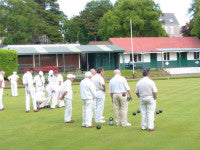
According to Brian Rogers, secretary of the Welsh Bowling Association, a combination of ageing and declining memberships is placing great pressure on many private bowls clubs, challenging their ability to prepare and present playing surfaces at a consistently high standard throughout the season.
If the decline in human and financial resources continues, clubs may need to consider a merger or a green-share arrangement with another club if members are to continue enjoying their sport.
The worst case scenario is closure, a step that has been forced upon a growing number of private bowling clubs in recent years.
Public authority bowling greens face similar challenges as a result of rising budgetary constraints and growing pressures to make club members pay more for using a facility that is viewed by many council taxpayers as a questionable expense, especially when membership numbers are fifty or less.
"The issue of sound greens maintenance is high on the Welsh Bowling Association's agenda," commented Brian. "We are looking at, and implementing, a number of measures designed to help retain a club's existing members, bring in new members and attract additional funding to ensure that greens are properly and consistently maintained."

With assistance from Sport Wales, measures currently being pursued include a coordinated development programme designed to help bowls clubs maintain and build healthy membership numbers, introduce complementary sports and social activities, attract additional funding and promote the game of bowls to younger players, aided by the formation of junior academies nationwide and the establishment of an under-25 international series.
"These initiatives are starting to bear fruit, but there is some way to go before we can say that every bowls club in Wales is financially secure and in a position to look after its green effectively and meet the standard required to host local, county and national league and cup matches," said Brian.
There is, however, another route open to bowls clubs that Brian's own club - Windsor Bowling Club, Penarth - decided to follow around thirteen years ago. The option the club selected continues to work extremely well, judging by the excellent condition of its two greens and the regular praise received from members and visitors.
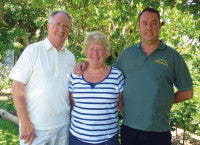
To help spread the cost and reduce pressure on the club's finances, Avon times its visits to Windsor Bowling Club to coincide with similar visits on the same day to a further three bowling greens in the Cardiff area, all of which are looked after within full maintenance contracts, including end-of-season autumn renovation.
The business also has a part maintenance contract with one other bowling club in South Wales, encompassing monthly advisory visits and applications of pesticides and fertilisers, as and when necessary, as well as autumn renovations.
Brian Rogers explained that their appointment came in the wake of successful autumn renovations completed by the firm in the late 1990s.
"The company's staff impressed the committee at the time with their knowledge, expertise and professionalism, attributes which continue today across a full range of fine-turf maintenance routines from mowing through to scarification, turf rolling, aeration and topdressing," said Brian. "Fertiliser and pesticide applications are carried out in consultation with the club and we are billed at cost for the materials used."
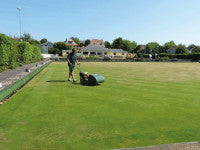
"Back then, we were happy to carry out maintenance and renovations on any playing surface and, as a new business, were very pleased to have the work," commented Yvonne, who has managed the company's office and paperwork since the start, while husband, Terry, was putting his extensive turf skills into practice.
Those skills had been acquired over almost twenty years working as a member of the groundstaff at the Imperial Tobacco Company's high-profile sports ground in Bristol, venue for international bowls tournaments, county cricket matches, plus local football, rugby, tennis and archery league and cup competitions involving the Imperial Sports Club.
In 1977, having reached the position of assistant head groundsman, Terry decided to seek pastures new, joining forces with friend Trevor Goverd who had asked him to help establish and manage the new sportsground maintenance side of his landscaping business, T J Goverd (Bristol) Ltd.
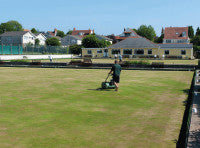
"I talked it over with Yvonne and she agreed that we should set up our own business, based at and run from our home," recalled Terry. "Taking the plunge, and with the help of a bank loan, I bought a van and a couple of mowers, took on a young assistant and Avon Sportsground Maintenance was born, starting with cricket square renovations in and around Bristol."
"Looking back, there is no way I could have succeeded without Yvonne's support and input on the administrative side of the business. She made sure that invoices were issued promptly and bills were paid on time."
Work on cricket grounds was followed shortly by requests to carry out autumn renovation of bowling greens, a skill that Terry had acquired during his time at the Imperial sports ground.
Whilst working at Imperial, he also had made a useful contact in the form of David Bryant, three-times World outdoor and indoor singles bowls champion and a member of Clevedon Bowling Club, which played periodically against Imperial Bowls Club.
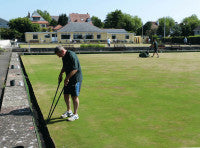
"It's safe to say that around ninety percent of the work I've carried out over the past thirty-three years has come from word of mouth alone. When we have advertised, it's been mostly in county annual handbooks read by bowling club members."
In 1984, Terry's eldest son, Matthew, joined the business full-time, having helped out previously on contracts during school holidays and after school.
Today, Matthew is a partner in the company alongside Terry and Yvonne, spending three weeks out of every four making advisory visits to the thirty-five or so bowls clubs who have signed-up to part maintenance contracts.
Located throughout the south Midlands, the south and south-west of England and south Wales, these clubs receive "just about everything but mowing" as part of their annual contract, paid for over twelve equal monthly instalments.
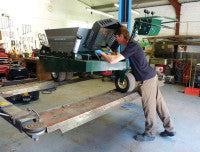
The remaining forty-odd bowling club greens on the books are looked after within full maintenance contracts which encompass year-round fine turf maintenance, ranging from mowing to over-seeding, and everything in between.
Grouped in clusters no more than an hour's drive from the company's base near Bristol, the greens tended within full annual maintenance contracts have remained at an almost constant number ever since Avon decided to go 'one hundred percent bowls' in the early 1990s.
"Looking back, it's gratifying to note that we've had sixty-five to eighty bowling greens on our books ever since we decided to concentrate fully on the sector," commented Terry. "That number is sufficient to keep us busy all through the year, whilst allowing time for staff training, refresher courses and holidays."
One of the promises made by Terry when visiting prospective customers in the early days of the business was that they "would never be without a professional greenkeeper."
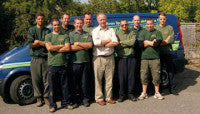
That promise holds good to this day and, although he now takes more of a back seat in the company at the age of sixty-nine, Terry still gets huge pleasure from visiting and "talking shop" with customers whom he has known and worked for over many years.
Looking forward, Terry says that the firm is in very good shape and employs first-class skilled staff who are suitably-qualified and proud to have the title "greenkeeper" after their name.
In addition to the skilled staff, the company currently employs one trainee and says that it welcomes applications from horticultural college students wishing to pursue a greenkeeping career.
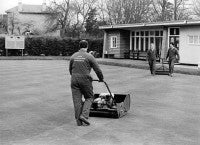
The mainstays of their campaign against seasonal turf diseases are Chipco Green, Bayer Dedicate and Everris Medallion TL, each being selected to suit turf conditions and the specific problem, either anticipated or existing.
Control of Dry Patch and water conservation are in the hands of Everris H2Pro Liquid, designed to maintain optimum levels of moisture within the rootzone, minimising stress in times of drought and preventing waterlogging following heavy or prolonged rain.
For season-long control of problem weeds, the company's greenkeepers rely primarily on Barclay's Holster, a turf herbicide developed specifically to control a range of broad-leaved weeds, including yellow suckling clover, slender speedwell, daisy and common mouse ear.
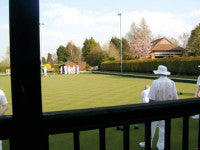
The principal autumn feed applied ahead of the winter is Everris Greenmaster Autumn 6:5:10+6Fe, which helps harden up the sward, control moss and maintain turf health and appearance during the colder months.
Topdressings used during autumn renovations are from Roffey Brothers of Bournemouth, whilst grass seed is supplied by British Seed Houses and DLF Trifolium using 80% fescue, 20% bent mixes containing top cultivars from the BSPB's annual grass seed lists.
Traditionally, physical access to public and private bowling greens has not been that easy, although improvements and alterations have been made at many clubs over the years to allow tractors and other ride-on machines to be driven onto the playing surface without damaging the perimeter drainage ditches.
This ability is welcomed for autumn renovations, when the use of a compact tractor makes light of former labour-intensive manual tasks such as deep aeration and scarification.
That said, the majority of Avon's fleet is pedestrian-controlled, most of which has provided many hours of trouble-free service and continues to produce first-class results.
Terry concluded by saying that he shares the concerns of Welsh Bowling Association secretary, Brian Rogers, about the future of bowls.
"There is no doubt that the game is under great pressure from a number of directions, none of which offer an easy escape route," he said.
"Sharing facilities is one option when the age of members, their numbers or funding levels prevent a club from keeping its greens consistently up to scratch. Clubs should be able to retain their own identities, but sharing the cost of greens maintenance makes sound economic sense. It would need good cooperation, but a positive attitude could spell the difference between survival and closure."
"Another option is for a group of clubs to band together locally and buy in professional fine-turf contract maintenance services, as offered by ourselves and other companies."
"The benefit of this approach is that members and visitors are assured that the green will always be prepared and presented to the same high standard, whilst the cost of travel, machinery depreciation and labour is being shared between several clubs.
A future business opportunity, perhaps, for Pitchcare members in other parts of the UK?
What's on the van?
Dennis Razor Ultra 560 fine-turf mowers
Ransomes 61 Super Certes mowers
Dennis Verticut
New Holland TC27D compact tractor
Turfco Mete-R-Matic self-propelled top dressers
Hardi KS-120 wheeled amenity sprayer with 4m boom
Pattisson Spikers
Wiedenmann Greens Terra Spike G6/13
Groundsman 460HD aerators
Graden GS04 pedestrian turf scarifier
Dennis S500 Plus spiker/slotter
Ryan Renothin scarifier
GreenTek Thatch-Away
verticutters
Pedestrian fertiliser spreaders
Various Sisis and Sisis Bray hand tools
